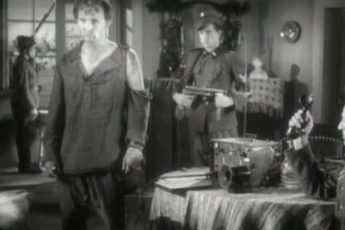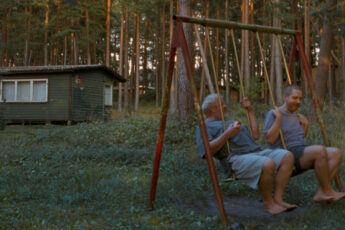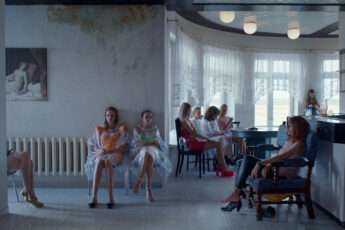Exterior Forces & Inner Worlds
Šarūnas Bartas’ Peace to Us in Our Dreams (Ramybė mūsų sapnuose, 2015)
Vol. 71 (January 2017) by Carlos Kong
Mist sits gently atop the deep green trees of the Lithuanian landscape, while deer prance through the undergrowth of the woods. The tranquility of these two consecutive images is ripped from its natural context at the sound of a blasting gunshot. As the deer bolt out of frame upon the sounding of the hunt, the film cuts, and the viewer is transported inside of a violin recital. The violinist (played by Lora Kmieliauskaite) performs a challenging solo piece, and as she reaches the end of a virtuosic phrase, she stops. Amidst the audience’s palpable silence, she closes her eyes, spins around slowly, giggles and raves ecstatically, only to run offstage at the realization of what she has ruined. Peace to Us in Our Dreams, the newest film by the acclaimed Lithuanian director Šarūnas Bartas, begins with these complimentary scenes of destabilization that dramatize the film’s thematic struggles —between retreat and escape, from the innocent to the implicated, and across the violations of exterior forces and inner worlds. Set over a lakeside weekend in the Lithuanian countryside, the film depicts a web of fragmented relationships in which understanding remains unspoken and dreams have yet to find their language.
Peace to Us in Our Dreams is centered on the dynamics between a taciturn man (played by the director), his teenage daughter from a former marriage (played by the director’s daughter, Ina-Marija Bartaite), and the violinist, who is also the father character’s new partner — who leave the city to spend a weekend together at the family’s country house. The violinist’s former moment of crisis during her recital foreshadows each character’s own struggles with alienation and impending collapse, as magnified throughout the film’s weekend time frame. At the heart of the estrangement that entangles the three protagonists is an absent, presumably dead mother — signaled by a close-up shot of a framed portrait photograph in the living room as well as by a truncated conversation, in which the daughter says to the father, “I’ve always wanted to talk more about mum but I’ve never found the right moment.” Yet this maternal absence becomes autobiographically inflected in melancholic memory through a scene that features home video footage of the late Russian actress Yekaterina Golubeva, Šarūnas Bartas’ former wife and Ina-Marija Bartaite’s mother. Experienced both individually and between one another, the film’s constitutive trauma imbricates fiction with lived experience and brings the characters into relations of dependency, albeit ones founded on silence, withdrawal, longing, and as the father phrases it, “the impossibility of total happiness.” From the film’s extremely minimal use of dialog to its frequent deployment of sharp cuts before conversations can fully unfold and meaning can be truthfully conveyed, Bartas presents a microcosmic world marked by each character’s own inability of transcending the loss that contours their inner worlds. The film’s most poetic and poignant moments are rooted in the protagonists’ mutual awareness of each other’s vulnerability, which nonetheless fails to culminate in a shared experience of understanding, catharsis, or remediation.
The retreat into nature serves to metaphorize the film’s multifaceted signs of alterity. In scenes of ordinary actions, such as the daughter running through the woods or the violinist plunging off the dock to swim in the lake, Bartas constructs striking, cryptic images of solitary leisure that augment the rift between the beauty of the natural world and the restlessness of inner life. Moreover, the various close-ups of each character hiding behind walls or trees, eavesdropping on one another’s conversations, or simply watching the others function to constitute the film’s dispersed gaze of surveillance that points to secrets, if not sheer voids, that remain unsaid yet not unfelt. This surveillance is taken to violating extremes in the family’s relation to the neighboring family on the lakefront. While the neighboring family’s elderly father voyeuristically watches the violinist swim nude in the lake, the teenage son steals a telescopic sight rifle from a local military troop in an ambiguous plan of escape that ends in retaliatory violence. The various intercut images seen through the stolen gun’s viewfinder transform the reticence of looking into latent aggressions enfolded into the everyday fabric of life and loss.
Despite the film’s emphasis on emotional qualities that oscillate between imprisoning interiority and ambivalent gestures of quasi-escape, Peace to Us in Our Dreams presents a filmic portrait that is much more philosophical than it is psychological. Each character’s stymied relations to one another and to their own individual instances of thwarted expression in turn formulate the film’s central meditation on the limits of language. Bartas’ choice to leave each character unnamed heightens the film’s grip on autobiographical realism while simultaneously casting shadows of anonymity and anxiety that overwhelm the free wills of the film’s protagonists. Additionally, two scenes directly confront the futility of words as vehicles of meaning. In the first, an unspecified stylish woman (played by Klavdiya Korshunova) — presumably a former lover or friend of the father—arrives unexpectedly one evening at the country house. In this moving scene set at the kitchen table, the woman is unable to explain why she has come because, as she tearfully confesses, “I get the impression that I won’t find the right words” — only to utter that she has realized that her hopes will not happen. In the second scene, a conversation between the father and the daughter, the father maintains, “Words aren’t the main thing” in response to the daughter’s self-censored articulations. As the father testifies, we spend life trying to distinguish between reality and phantasms and are “limited by our perception of things.” From the flustered transmission of authentic disappointment to the inability of telling presence from absence, words constitute the violence of language that enacts the film’s most lacerating source of philosophical doubt.
In Peace to Us in Our Dreams, Šarūnas Bartas presents a web of individuals attempting to run away from something, all of who remain unable to escape. While the imprisonment of interior life overtaking external surroundings is magnified in the scenic and remote Lithuanian countryside, the silent microcosm that Bartas envisions is not exclusively defined by negativity. Upon being asked about his favorite season in a mildly flirtatious conversation, the teenage son of the neighboring family explains his love for winter by telling the daughter, “There is nothing more beautiful than snow falling in your eyes.” The son’s answer dramatizes the utopian longing that enlivens Peace to Us in Our Dreams, in which beauty radiates into moments felt beyond sight and sensory onrush frees us from the banality of language and the burden of self-expression. Šarūnas Bartas’ deeply affective film not simply investigates the silences that constitute our moments of lack and unfinished memories but also upholds the possibility of peace as a figment that arrives to us—somewhere in our dreams.




Leave a Comment